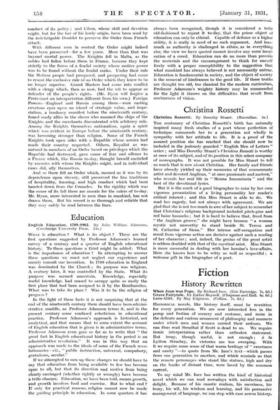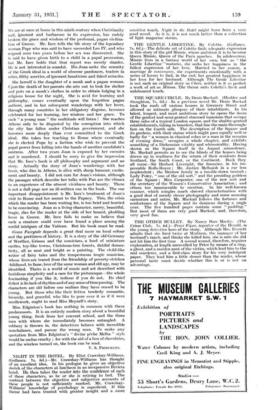Fiction
History Rewritten
Love-Girl. By May Edginton. (Collins. 7s. 6d.) HISTORICAL novels, like history itself, must be rewritten for every generation. We are now interested less in the pomp and fustian of scenery and costume, and more in the delicate and curious armament of philosophy and manners under which men and women carried their ardours. We can thus read Stendhal if Scott is dead to us. We require ironic interpretation rather than orthodox statement.
But irony, though useful, is not enough ; in Lytton Strachey, its victories are too sweeping. With it we require some sense of that warm heritage of " sweetness and sanity "—to quote from Mr. Ince's text—which passes from one generation to another, and which reminds us that the remote personages who stand like statues, high and dry on the banks of distant time, were laved by the common Current.
To my mind Mr. Ince has written the kind of historical novel which we can read nowadays with satisfaction and delight. Because of his caustic realism, his merriness, his irony, his wit, his wisdoni and learning, and his persuasive management of language, we can step with ease scrims history. We are at once at home in this ninth century when Christianity
naif, ignorant and barbarous in its expression, has rudely broken the grace and wisdom of, the profound, pagan civiliza- tion of Greece. Mr. Ince tells the life story of the legendary woman Pope who was said to have succeeded Leo IV, and who reigned over two years before her sex was discovered. She is said to have given birth to a child in a papal procession, but Mr. Ince holds that that report was merely slander. He is not interested in scandal. His Joan seeks the serenity of the Greek ideal in a world of obscene pardoners, traders in relies, filthy ascetics, of ignorant fanaticism and faked miracles.
She herself is the daughter of a monk and a pagan woman.
Upon the death of her parents she sets out to look for shelter and puts on a monk's clothes in order to obtain lodging in a religious house for the night, She is avid for learning and philosophy, comes eventually upon the forgotten pagan authors, and in her subsequent wanderings with her lover, through many countries in her obligatory disguise, becomes celebrated for her learning, her wisdom and her grace. To such " a young man " the multitude will listen ! She reaches Athens only to be disgusted by the corruption into which the city has fallen under Christian governinent, and she becomes more deeply than ever committed to the Greek ideal. She takes her teaching to Rome where eventually she is elected Pope by a faction who wish to prevent the papal power from falling into the hands of another candidate's mistress. After two years Joan is exposed by her enemies and is murdered. I should be sorry to give the impression that Mr. Ince's book is all philosophy and argument and no story. Actually the story of Joan's wanderings with her lover, who dies in Athens, is alive with sharp humour, excite- ment and beauty. I did not care for Joan's visions, although the passages which describe her talks with Pan are the'climax to an experience of the utmost vividness and beauty. There is not a dull page nor an ill-written one in the book. The one important disappointment is Mr. Ince's treatment of Joan's visit to Rome and her ascent to the Papacy. This, the crisis which the reader has been waiting for, is too brief and hurried to be convincing. Joan as a living character, merry, beautiful, tragic, dies for the reader at the side of her honest, plodding lover in Greece. Mr. Ince fails to make us believe that such a creature could ever have found a place among the sordid intrigues of the Vatican. But his book must be read.
Grave Fairytale depends a great deal more on local colour
and the prettiness of history. It is a story of the old Germany of Werther, Grimm and the musicians, a land of miniature castles, toy-like towns, Christmas-tree forests, dutiful domes ticity, all as neat and bright as a painting. The child-like writer of fairy tales and the tempestuous tragic musician, whose lives are traced from the friendship of poverty-stricken :childhood, to fame, love of the same woman and old age, may be identified. Theirs is a world of music and art described with fastidious simplicity and a care for the picturesque—the whole fascinating if you like it, tedious if you do not. Its chief defect is its lack of rhythm and of any sense of time passing. The characters are old before one realizes they have ceased to be young. But those who like their fiction tenderly romantic, leisurely, and graceful, who like to pore over it as if it were needlework, ought to read Miss Meynell's story.
Miss Edginton's book has nothing in common with these predecessors. It is an entirely modern story about a beautiful young thing, fresh from her convent school, and the three men with whom she immediately becomes entangled. A robbery is thrown in, the detectives behave with incredible nonchalance, and pursue the wrong man. To make any quotation from Miss Edginton's " divine peche Melba " style would be undue cruelty ; for with the aid of a box of chocolates, and the wireless turned on, the book can be read.
V. S. PRrIVIIETT.







































 Previous page
Previous page